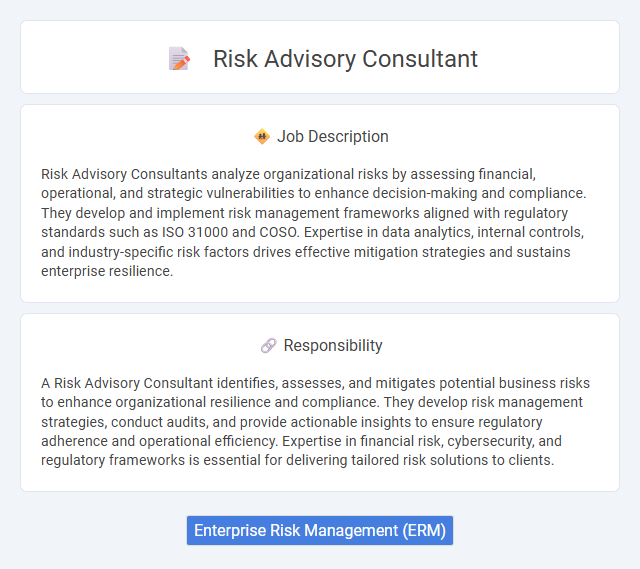
Risk Advisory Consultants analyze organizational risks by assessing financial, operational, and strategic vulnerabilities to enhance decision-making and compliance. They develop and implement risk management frameworks aligned with regulatory standards such as ISO 31000 and COSO. Expertise in data analytics, internal controls, and industry-specific risk factors drives effective mitigation strategies and sustains enterprise resilience.
Individuals with strong analytical skills and a keen attention to detail are likely to excel as Risk Advisory Consultants, as the role demands careful assessment of potential risks. People comfortable with strategic thinking and complex problem-solving may find this job suitable, given its focus on identifying vulnerabilities and recommending mitigation strategies. Those who prefer predictable tasks or working independently might find the dynamic and collaborative environment challenging.
Qualification
Candidates for a Risk Advisory Consultant role typically require a bachelor's degree in finance, accounting, business administration, or a related field alongside professional certifications such as Certified Risk Manager (CRM), Certified Internal Auditor (CIA), or Certified Information Systems Auditor (CISA). Strong analytical skills and experience with risk assessment methodologies, regulatory compliance frameworks like COSO or ISO 31000, and proficiency in data analytics tools are essential qualifications. Expertise in identifying potential risks, developing mitigation strategies, and advising stakeholders across various industries enhances a consultant's effectiveness in this position.
Responsibility
A Risk Advisory Consultant identifies, assesses, and mitigates potential business risks to enhance organizational resilience and compliance. They develop risk management strategies, conduct audits, and provide actionable insights to ensure regulatory adherence and operational efficiency. Expertise in financial risk, cybersecurity, and regulatory frameworks is essential for delivering tailored risk solutions to clients.
Benefit
Risk Advisory Consultant roles likely offer significant benefits including enhanced professional development through exposure to diverse industries and complex business challenges. There is a probability of gaining valuable expertise in risk management frameworks and regulatory compliance, which can increase career advancement opportunities. Employees may also benefit from competitive compensation packages and a collaborative work environment that fosters continuous learning.
Challenge
Risk Advisory Consultant roles likely involve navigating complex regulatory environments and identifying potential threats to business continuity. The challenge may stem from analyzing vast amounts of data to predict and mitigate risks before they escalate. Professionals in this field probably need to stay updated on evolving industry standards and emerging risks to provide effective counsel.
Career Advancement
Risk Advisory Consultants develop expertise in identifying and mitigating financial, operational, and compliance risks for diverse industries. Career advancement often leads to senior advisory roles, management positions, or specialization in areas such as cybersecurity, regulatory compliance, or data analytics. Strong analytical skills and industry certifications like CRM or CISA significantly enhance promotion opportunities and salary growth.
Key Terms
Enterprise Risk Management (ERM)
A Risk Advisory Consultant specializing in Enterprise Risk Management (ERM) evaluates organizational risks to develop comprehensive strategies that mitigate financial, operational, and strategic threats. They implement risk assessment frameworks aligned with industry standards such as COSO and ISO 31000 to enhance decision-making and ensure regulatory compliance. Expertise in risk identification, analysis, and reporting enables businesses to optimize governance and achieve sustainable growth.
 kuljobs.com
kuljobs.com